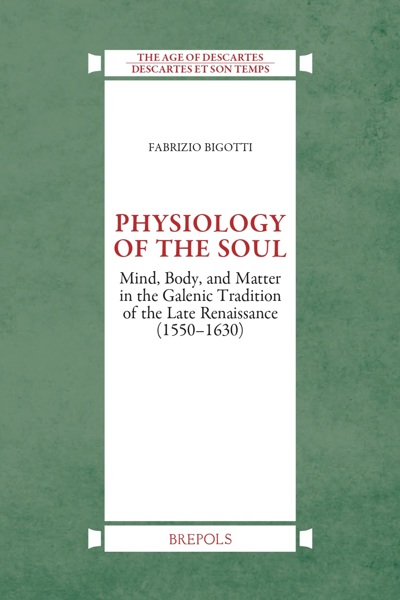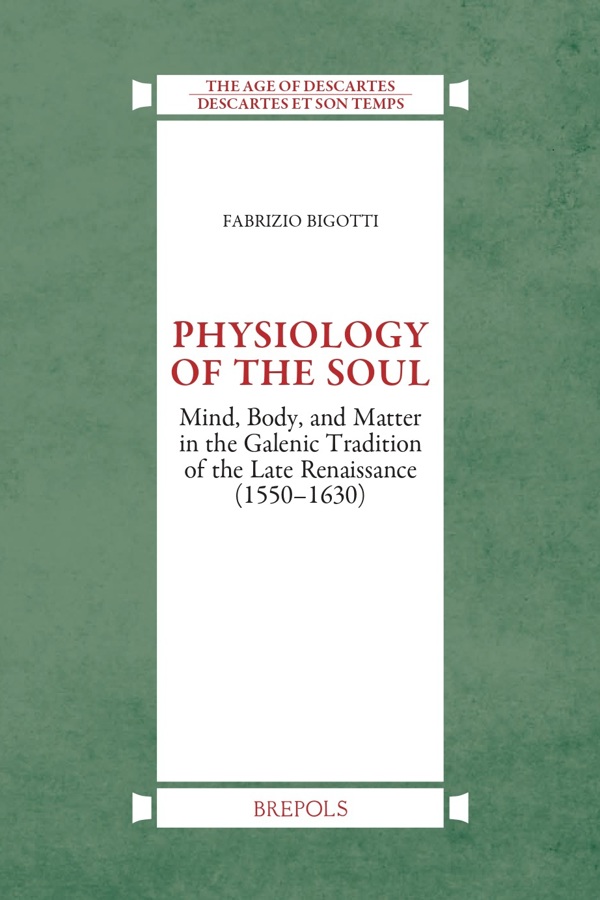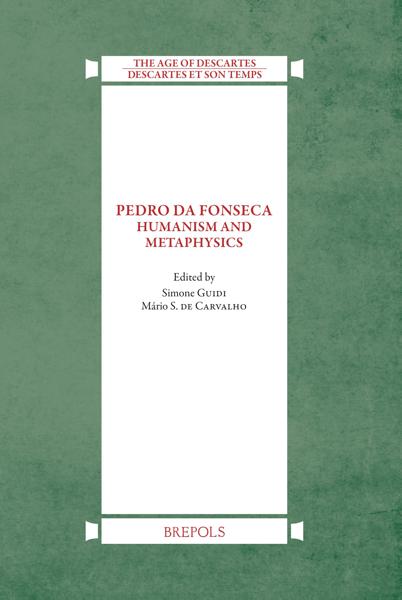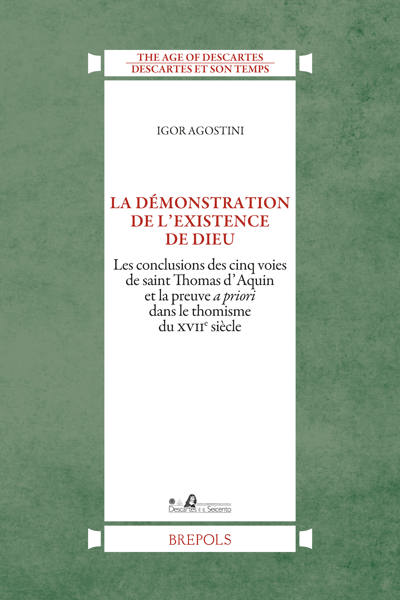
Physiology of the Soul
Mind, Body and Matter in the Galenic Tradition of the Late Renaissance (1550-1630)
Fabrizio Bigotti
- Pages: 366 p.
- Size:156 x 234 mm
- Illustrations:34 b/w, 19 col., 7 tables b/w.
- Language(s):English
- Publication Year:2019
- € 85,00 EXCL. VAT RETAIL PRICE
- ISBN: 978-2-503-58161-3
- Paperback
- Available
- € 85,00 EXCL. VAT RETAIL PRICE
- ISBN: 978-2-503-58166-8
- E-book
- Available
How did late-Renaissance physicians and philosophers move beyond accepted patterns in developing Galen's philosophical legacy?
« Dans l’ensemble, l’ouvrage fournit donc une bonne synthèse sur l’histoire de l’âme dans la tradition médicale du xvie siècle. Sa revalorisation de la pensée médicale au sein de l’histoire de la philosophie démontre la vitalité et la fécondité de la scolastique tardive comme mode de pensée, mais aussi l’intérêt d’examiner le discours médical, qui déborde souvent le strict cadre scientifique pour toucher aux aspects éthiques, politiques ou éducatifs. » (Joël Chandelier, dans l’ Histoire, médecine et santé, 21, 2022, p. 209-211).
Fabrizio Bigotti is Senior Research Fellow at the Institut für Geschichte der Medizin of the Julius-Maximilians University in Würzburg (Germany), and Honorary Research Fellow of the Centre for Medical History of the University of Exeter (UK). He has held postdoctoral and research positions at the Warburg Institute of London, the University of Exeter, the University of Padua and the Folger Institute of Washington D.C., and is the founder and current Director of the Centre for the Study of Medicine and the Body in the Renaissance (CSMBR) in Pisa. His interests cover areas such as metaphysics, history of technology and reconstruction of historical instruments, and history of quantification and applied mathematics, with a particular emphasis on the recovery of classical and medieval philosophy, literature and experimental practices in the early modern period.
This study looks at the ways in which physicians and philosophers developed Galen's philosophical legacy at the end of the Renaissance, and shows how their reading of classical medical texts moved beyond accepted patterns and conventions.
By challenging a traditional historiographical account that described Renaissance Galenism in terms of decline and fall, this study argues for a new assessment of Galen's legacy, also read through the lens of those who opposed or reacted critically to it and thus contributed to the shaping of important aspects of the early modern debate on anthropology, ethics, psychology and even quantified experimentation. Among these many innovations and transformations, the notion of 'ingenuity' (ingenium) deserves particular attention. Hidden within this corporeal, inherent and heritable inclination, two major themes that side disquietingly with the development of modern subjectivity can be identified: the 'corporeality of the body', and the common destiny of humans and animals.
More generally, this study offers a contribution to the ongoing debate on the role and value of medical history, arguing in favour of the concept of 'historical translatability' in balancing the longue durée of traditions with the chaotic interactions of individual thinkers.
List of Abbreviations
List of Figures
List of Plates
Acknowledgements
Introduction
Part One - Premises
Chapter One - Body and Anatomy in the Galenic Tradition
The Reflourishing of Anatomical Studies
Questions of Method
Soul and Anatomy
Materia sentiens
Generation and Essence
Galenic Anthropology
Alexandrianism and Galenism
Chapter Two - The Soul, A Physical Question
The Seat of the Rational Soul
The Brain: Form and Function
Sensus communis
The Relation between the Whole and Its Parts
Vexatae quaestiones
Innate Heat
A Late-Renaissance Polemic: Cesare Cremonini and Pompeo Caimo
Medicine for the Soul and Treatment for the Passions
Part Two - Developments
Chapter Three - From Galen to Huarte: The Quod animi mores and the 'Theory of Ingenium'
Themes and Arguments in the Quod animi mores
Constitution, Typology, and Physiognomy
Analogy and Consecution: An Advanced Model
Juan Huarte's Examen de ingenios (1575)
Natura facit habilem
Intuition and Genius
Principles of Eugenics
From mens to ingenium
Chapter Four - The Matter of the Spirit
Antonio Persio's Trattato dell'ingegno dell'huomo (1576)
From Galenism to Naturalism: Agostino Doni's De natura hominis libri duo (1581)
Naturalism and Medicine in Bernardino Telesio's Quod animal universum (1590)
The 'Two Souls' in Telesio's Philosophy
Spiritus ingenium est: From Physiology to Ethics
Eustachio Rudio's Liber de anima (1611)
Heat and Life
The Vegetable - Animal Continuum
Essence, Quality, and Degree
Part Three - Reactions and Consequences
Chapter Five - Passion and Pathology: The Response of Aristotelianism
The Individual, Nature, and Character in Francesco Piccolomini's Universa philosophia de moribus (1583)
Causal Consecution
Natural Inclination and Pathology
Cesare Cremonini's Quaestio: utrum animi mores corporis sequantur temperamentum
Lectures I-III
Lectures IV-V
Lectures VI-VII
Forms of Causality: The Model of Intrinsic Finality
Giovanni Battista Persona's Commentary on the Quod animi mores (1602)
The Ambiguous Relation between Mind and Brain
'Removing the Animal'
Chapter Six - Beyond Tradition: Santorio and Descartes
The Concept of Equilibrium Transformed: Santorio
From Degree to Quantity
Differences and Analogies: Santorio, Galileo, and Alexandrian Science
Substance and Quality in the Methodus vitandorum errorum omnium (1603)
Situs, Figura, Numerus
The Body and the Machine
Sources and Problems in Descartes' Medicine
Experiment or Observation? Descartes on the Movement of the Heart and the Arteries
Unsettling Similarities
Descartes and Naturalism: A Project in Common
Vestiges of Animality
Final Remarks - The Role of Tradition in Medical Thought
Plates
Bibliography
- Manuscripts
- Ancient Print and Fascimile Editions (Up to the 18th Century)
- Secondary Literature
Index of Concepts and Terms
Index of Names and Titles




